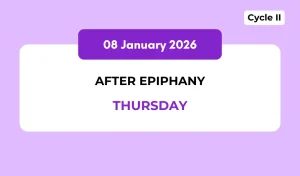The Baptism of the Lord
08th January 2024 (Monday)
Psalter: Proper
Reading of the Day
First Reading: Isaiah 55:1-11
Thus says the Lord: “Come, everyone who thirsts, come to the waters; and he who has no money, come, buy and eat! Come, buy wine and milk without money and without price. Why do you spend your money for that which is not bread, and your labour for that which does not satisfy? Listen diligently to me, and eat what is good, and delight yourselves in rich food. Incline your ear, and come to me; hear, that your soul may live; and I will make with you an everlasting covenant, my steadfast, sure love for David. Behold, I made him a witness to the peoples, a leader and commander for the peoples. Behold, you shall call a nation that you do not know, and a nation that did not know you shall run to you, because of the Lord your God, and of the Holy One of Israel, for he has glorified you. “Seek the Lord while he may be found; call upon him while he is near; let the wicked forsake his way, and the unrighteous man his thoughts; let him return to the Lord, that he may have compassion on him, and to our God, for he will abundantly pardon. For my thoughts are not your thoughts, neither are your ways my ways, declares the Lord. For as the heavens are higher than the earth, so are my ways higher than your ways and my thoughts than your thoughts. “For as the rain and the snow come down from heaven and do not return there but water the earth, making it bring forth and sprout, giving seed to the sower and bread to the eater, so shall my word be that goes out from my mouth; it shall not return to me empty, but it shall accomplish that which I purpose, and shall succeed in the thing for which I sent it.
Isaiah 12:2-3, 4bcd, 5-6 (R. 3)
R/. With joy you will draw water from the wells of salvation.
Alleluia
V/. Alleluia R/. Alleluia
V/. John saw Jesus coming towards him, and said: Behold, the Lamb of God, who takes away the sin of the world.
R/. Alleluia
Gospel: Mark 1:7-11
At that time: John preached, saying, “After me comes he who is mightier than I, the strap of whose sandals I am not worthy to stoop down and untie. I have baptised you with water, but he will baptise you with the Holy Spirit.” In those days Jesus came from Nazareth of Galilee and was baptised by John in the Jordan. And when he came up out of the water, immediately he saw the heavens being torn open and the Spirit descending on him like a dove. And a voice came from heaven, “You are my beloved Son; with you I am well pleased.”
Daily Gospel Reflection
Highlight: Baptised and Commissioned!
Guidlines: The baptism of Jesus is an indication of the identity and mission of Jesus. Thus, it is also a confirmation of the same
The Baptism of the Lord outlines four aspects:
- Indicates the radical mission of Jesus
- Such a mission is rooted in his communion with the Father
- Initiates his mission
- Reminds our own baptismal consecration and mission
1. The event of the baptism of Jesus indicates his “radical mission”, which is a mission of salvation or redemption. Originally, in the Biblical context, saviour or redeemer connotes the idea of one who acts on behalf of or in favour of someone in slavery or in debt, or who is a victim of injustice.
2. Accordingly, a redeemer renders justice by winning over the opponent or relieving or liberating, with a ransom. In fact, the English term “redeem” evidently means to “make one deemed again”, or to restore the lost dignity. Thus, Jesus undertakes this mission of salvation or redemption from a situation of misery and bondage.
3. So, Jesus’ mission implies an unending story of God’s mercy and compassion toward humanity, which is a victim and slave of sin. It implies his condescending forgiveness of their sins. Further, it also indicates their liberation. This is done through his identification with them, his solidarity with them, and his expiation for them by self-immolation.
4. Now, how this mission is denoted by his baptism? Baptism was needed for those who are beset by sin, who need conversion, forgiveness, and purification. But, Jesus, the Son of God, did not need to be baptised, because he is sinless.
5. But still, he allows himself to be baptised because he keeps himself in our place, he carries our burden of sin, he shares our human weakness, and he gets into solidarity with us in our human situation of fragility.
6. His baptism confirms his communion with the Father, in which his mission is rooted. The obvious signs and testimonies of this communion are: the descent of the Holy Spirit, and the attestation of the Father from heaven, “You are my Son, in whom I am well pleased”.
7. Jesus’ baptism initiates his “concrete mission”, which manifests itself in preaching and healing. This is a holistic mission, viz. of heart, word, and deed, namely, conversion of heart, announcing the good news in word, and healing in deed. His baptism marks the beginning of his ministry. So, on receiving baptism, Jesus immediately plunges into his relentless Kingdom-mission.
8. Jesus’ baptism reminds us of our own baptism and challenges us to renew and live our baptismal consecration. Our baptism is not merely a ritual or a tradition. It is an insertion into the very life of Jesus.
9. It is incorporation into the mystical body of Christ, the community of the Church. It is an imitation and resemblance of Christ. It is consecration to God. This can imply four aspects: We belong to God; we are totally owned/possessed by God; we remain loyal to God and His kingdom; we bear witness to Jesus and his values, through sharing in his own mission.
10. What does the baptism of Jesus mean for us today? Is it only a commemoration of a past event in the life of Jesus or the history of the church? Is it only an instance that marks the start of Jesus’ mission? How does this feast summon us to “be daily baptised”, i.e. be charged and animated by the Holy Spirit and fire?
11. How do we constantly strive to grow into the person and life of our Master? How do we grow into spiritual and fraternal communion with the community of the Church? How are we loyal and committed partakers and perpetuators of the same mission of Jesus, which is liberation and integration?







